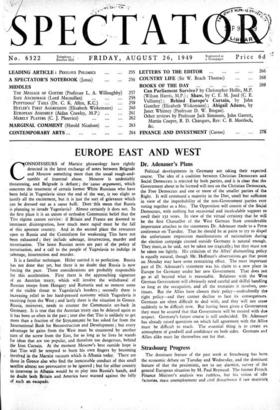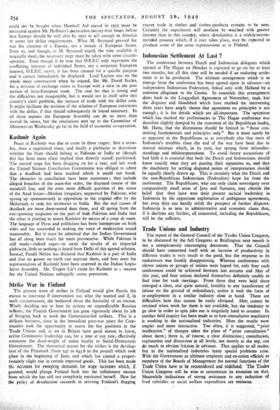Strasbourg Progress
The dominant feature of the past week at Strasbourg has been the economic debate on Tuesday and Wednesday, and the dominant feature of that the pessimistic, not to say alarmist, survey of the general European situation by M. Paul Reynaud. The former French Finance Minister's analysis was ruthless, but his vision of idle factories, mass unemployment and civil disturbance if raw materials{
could not be bought when Marshall Aid ceased in 1952 must be measured against Mr. Hoffman's declaration twenty-four hours before that Europe should be well able by 1952 to sell enough to America to cover her dollar requirements. What M. Reynaud pressed for was the creation of a Europe, not a mosaic of European States. Even so, and though, as M. Reynaud urged, the time available is tragically short, the necessary steps must be taken with some circum- spection. Even though it be true that O.E.E.0 only represents the conflicting interests of individual States, not a corporate European interest, 0.E.E.C. exists, it has been created for a specific purpose and it cannot immediately be displaced. Lord Layton was on the whole more constructive when he argued, like Mr. David Eccles, for a revision of exchange ratios in Europe with a view to the pro- motion of intra-European trade. The case for that is strong and the difficulties not insuperable, but it would not in itself solve this country's chief problem, the increase of trade with the dollar area. It might facilitate the revision of the relation of European currencies with the dollar, if that should subsequently be found necessary. In all these matters the European Assembly can do no more than record its views, but the resolutions sent up to the Committee of Ministers on Wednesday go far in the field of economic co-operation.































